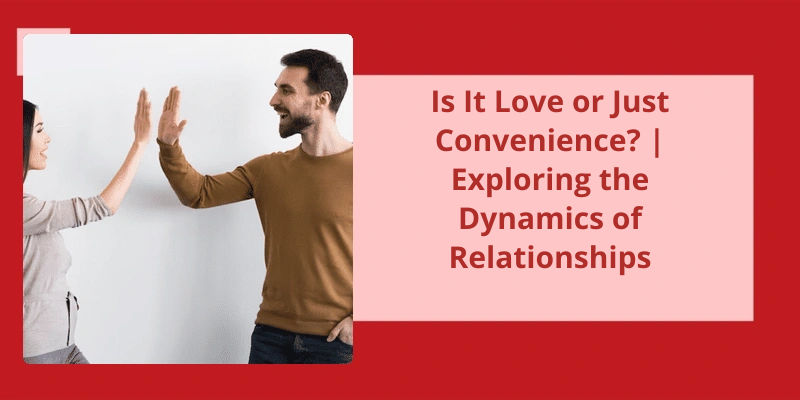The concept of true love has fascinated human beings for ages. The idea of finding that perfect someone who complements your existence and completes your soul is both romantic and comforting. However, as we navigate the complexities of modern relationships, we’re left to ponder if love is the primary motivator or just convenience. With increasing emphasis on personal and professional growth, individualism and career goals can often take precedence over romantic relationships, shifting the balance towards convenience. On the other hand, the desire for love and companionship remains strong, leading some to enter into relationships for convenience over love. So, is it love or is it just convenience? The answer is often intricate and nuanced, influenced by cultural, social, and psychological factors.
What Does It Mean to Be a Convenience to Someone?
Typically, being a convenience to someone means you serve a purpose or fill a need in their life that’s beneficial to them but not necessarily reciprocal. This can be anything from running errands for them, lending them money, or even just being there for them when they need emotional support. In most cases, you do these things because you genuinely care about the other person and want to help them however you can. However, being a convenience to someone suggests that they’re taking advantage of your kindness and using you for their own benefit.
On the one hand, you don’t want to be so accommodating that the other person feels entitled to your time or resources. On the other hand, you also don’t want to jeopardize the relationship by refusing to help them when they truly need it. It’s important to establish boundaries early on in the relationship and stick to them. This lets the other person know that you’re willing to help but only within reason.
Another aspect of being a convenience to someone is that it can breed resentment over time. If you feel like you’re constantly being asked to do things for someone else and never receiving the same level of support or kindness in return, it’s easy to start feeling used. Resentment can build up, and soon you find yourself doing things out of obligation rather than out of genuine care for the other person. This can ultimately lead to the breakdown of the relationship, as the other person senses your hostility and feels like they can no longer rely on you.
This type of relationship can breed resentment and ultimately end in the breakdown of the relationship. Remember to value yourself and your own needs in any relationship you pursue.
However, sometimes we fail to realize that we’re actually in a relationship of convenience and not in a genuine relationship. It’s important to identify if you’re in a relationship of convenience so that you can make an informed decision about the future of your relationship. In this article, we’ll discuss some of the signs that indicate that you’re in a relationship of convenience.
How Do You Know if You’re in a Relationship of Convenience?
We question whether were with that person because we genuinely love them, or if were just with them because it’s familiar and comfortable. A relationship of convenience can be detrimental because it’s not built on love and mutual respect. Instead, it’s founded on the fear of being alone or not being able to provide for ourselves.
One way to determine if youre in a relationship of convenience is to think about what you truly want in a partner. Do they meet those expectations? Are they kind, caring, and supportive? Or do you feel like youre settling for something less than what you deserve? Often, we ignore red flags or settle for less because were afraid of being alone.
Another sign of a relationship of convenience is the lack of communication. Do you and your partner truly communicate and understand each others needs and wants, or do you just go with the flow and avoid tough conversations? A relationship of convenience might seem comfortable because you don’t have to rock the boat, but it’s not a healthy or fulfilling dynamic.
Financial dependence is also a common factor in a relationship of convenience. Are you only with your partner because they provide for you financially, or do you contribute equally to the relationship? It’s important to have a balance of financial responsibility in a relationship to avoid resentment and dependency.
Are you truly happy in the relationship, or are you just settling? It’s okay to be alone and wait for the right person instead of staying in a relationship that isnt meeting your needs.
Ultimately, a healthy relationship is built on love, respect, and equal partnership. It’s important to prioritize your own happiness and not settle for something that isnt fulfilling.
Common Reasons Why People Stay in Relationships of Convenience
A relationship of convenience is a partnership that lacks emotional intimacy or romantic connection. People often stay in these types of relationships for practical reasons such as financial stability, fear of being alone, or convenience. They may also avoid ending the relationship because of the potential emotional toll or the social stigma associated with a breakup.
Source: Why Our Generation Chooses To Be In Relationships Of …
As important as financial stability is, it isn’t the only factor to consider when it comes to marriage. A marriage for convenience may bring some benefits, but it may fall short when it comes to fulfilling emotional needs. It’s important to weigh the pros and cons before making a decision on whether to marry for convenience or not.
Should You Marry for Convenience?
Marriage is a significant decision in anyones life. The decision to marry someone shouldn’t be taken lightly. One of the primary reasons people consider marrying for convenience is for financial stability. Emotional connection, love, and affection are essential for a healthy and enduring marriage. A marriage for convenience that lacks these elements may eventually lead to distance, resentment, and ultimately, a failed marriage.
They may end up feeling trapped in a loveless marriage with no hope of escape. The lack of emotional connection can also lead to mental health issues such as depression and anxiety. Moreover, if one partner begins to feel resentful or neglected, it can lead to arguments, fights, and even domestic violence.
Another significant concern is the potential impact of a marriage for convenience on children. Children are very perceptive and easily pick up on the tension and lack of love in a marriage. Living in a loveless environment can have long-lasting psychological effects on children, leading to emotional and behavior problems. A happy home environment is essential for the healthy development of children.
How Different Factors Such as Age, Family, and Career Goals May Influence Decisions to Marry for Convenience
- Age
- Family
- Career goals
- Financial considerations
- Desire for companionship
- Cultural or religious beliefs
- Immigration reasons
- Legal benefits
- Personal values and beliefs
- Social pressure
Marrying for love has become increasingly popular over the years, with more and more people choosing to tie the knot based on their feelings towards one another. While this decision isn’t always an easy one, those who do marry for love often feel that they’ve landed on a happy and successful life. However, the journey towards a love marriage is often fraught with trials and tribulations, with couples being tested on their commitment at every turn. Nonetheless, this is often what encourages them to demonstrate an unyielding devotion that puts them on the path to a lifelong bond.
Why Is It Better to Marry for Love?
Moreover, the foundation of love-based marriage is respect, trust, and mutual understanding. Such a foundation contributes significantly to the success of the marriage. Both partners respect each others feelings, aspirations, goals, and beliefs, and they can quickly recover from any disagreement or conflict. Consequently, they form a supportive and caring relationship that brings joy, happiness, and fulfillment to their lives.
Another advantage of marrying for love is that the partners involved are willing to work on improving the relationship continuously. They’re committed to enhancing their communication skills, adjusting to each others needs, seeking out new experiences together, and growing as individuals. This attitude helps in strengthening the marriage and ensures that it remains solid in the face of challenges that may come.
In contrast, arranged marriages often involve one or both partners conceding to an agreement made by their families or society. The pressures and expectations that come with such arrangements can create an unhealthy dynamic between partners, causing resentment, frustration, and feelings of powerlessness. Additionally, these couples are less likely to enter the union with the same level of commitment, trust, respect, and mutual understanding that are present in love-based marriages.
The Psychological Impact of Love-Based Marriages Versus Arranged Marriages on Individuals and Society
This article discusses the psychological effects of both love-based and arranged marriages on individuals and society, exploring the potential benefits and drawbacks of each.
As social norms evolve, the idea of marriage and it’s purpose becomes increasingly complex. A convenient marriage, for example, has gained popularity in recent years and is no longer a thing of the past. It’s a strategic move made for social, political, or economic reasons, as opposed to a romantic union based on mutual affection. In this article, we will delve deeper into the meaning of a convenient marriage and explore the reasons behind why couples choose this route.
What Is the Meaning of Convenient Marriage?
Convenient marriage is a term that defines the practice of marrying someone for reasons other than mutual love or passion. This type of marriage is characterized by the prioritization of social, economic, or political benefits over emotional or romantic ones. In essence, it’s a union formed solely for pragmatic reasons rather than for mutual affection. While this may seem like an outdated practice, it still exists in some societies where traditions and cultural practices often dictate the terms of marriage.
In a convenient marriage, individuals may enter into an agreement for different reasons, including wealth, power, status, or survival. This type of marriage is common in societies where arranged marriages are still prevalent. Here, parents or family members may arrange a marriage for their children to secure the familys social standing, ensure financial stability, or protect their lineage. The partners involved in a convenient marriage may not have any romantic inclination towards each other; however, they must comply with the terms of the agreement.
Despite it’s practical nature, a convenient marriage can have various pros and cons. On the one hand, it can provide economic security, social standing, and protection to the couple and their families. It may also offer opportunities for advancement, especially in societies where pedigree and social class are highly valued. On the other hand, it can lead to unhappy and unfulfilling relationships, emotional detachment, and a lack of intimacy. In the worst cases, it may even result in abusive or exploitative unions.
In love marriage, individuals choose their partners based on their personal feelings of affection, attraction, and compatibility. While the two types of marriage can coexist and even overlap, they reflect different attitudes and expectations towards marriage and relationships.
It’s no secret that many people believe that marriage is the ultimate form of commitment in a romantic relationship. The reasons for this viewpoint are abundant, but it mostly stems from the deep emotional, spiritual, and physical bond that marriage represents. Whether you’re tying the knot with your soulmate, or considering taking the plunge, there are many advantages to building a life with your partner in marriage. In this article, we’ll explore some of the reasons why marriage is the best form of relationship.
Why Marriage Is the Best Form of Relationship?
Marriage is a unique relationship where two individuals agree to commit themselves to each other in a sacred bond. It brings two persons together in a way that no other relationship can. Marriage offers emotional and psychological security to both individuals and provides a sense of belongingness. It’s an assurance that someone will always be there, no matter what happens.
In marriage, both individuals share their lives, hopes, dreams, fears, and even finances. This shared life creates a deep sense of intimacy and strengthens the connection between the two partners. The mutual trust, support, and understanding of each other can lead to a peaceful and happy life. If you ever face any challenges or difficulties, you can rely on your partner for emotional and practical support.
Another significant advantage of marriage is that it offers stability for the partner and a safe and secure environment for children. Children born and raised in a stable and loving environment tend to have better emotional and social development than those raised in a single-parent household. A committed and loving relationship between parents sets an excellent example for children that they can carry forward into their adult lives.
Conclusion
In conclusion, when determining whether a relationship is based on love or convenience, it’s essential to look beyond surface-level factors. While convenience or comfort may play a role in the beginning stages of a relationship, true love is built on a foundation of trust, mutual respect, and genuine affection. Love isn’t always easy, and it requires effort, compromise and a willingness to face challenges together. Convenient relationships may offer short-term benefits, but they often lack the emotional depth and intensity of true love. Ultimately, the key to determining whether a relationship is based on love or convenience is to listen to your heart and trust your instincts. Only then can you make a clear and informed decision about the future of your relationship.






